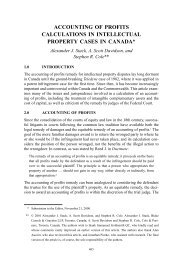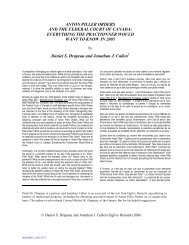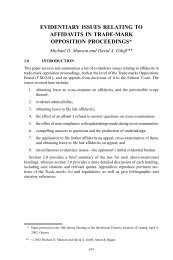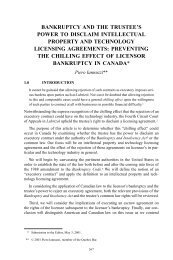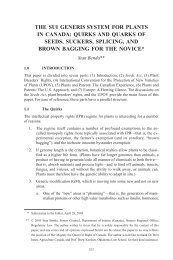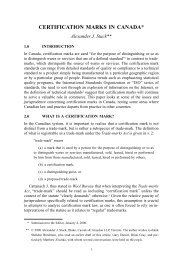A Comparative Overview of Canadian, US and European ...
A Comparative Overview of Canadian, US and European ...
A Comparative Overview of Canadian, US and European ...
Create successful ePaper yourself
Turn your PDF publications into a flip-book with our unique Google optimized e-Paper software.
Accounting <strong>of</strong> Pr<strong>of</strong>its<br />
See CETA Article<br />
21(a)(ii). This article<br />
requires no change to<br />
<strong>Canadian</strong> law.<br />
Permanent Injunction<br />
See CETA Article 20.1.<br />
This article requires no<br />
change to <strong>Canadian</strong><br />
law.<br />
Interlocutory<br />
Injunction<br />
In an accounting <strong>of</strong> pr<strong>of</strong>its, the amount<br />
owing to the patentee is measured by the<br />
infringer’s gain, rather than by the<br />
patentee’s loss. This remedy is<br />
discretionary; a patentee may request an<br />
accounting <strong>of</strong> pr<strong>of</strong>its instead <strong>of</strong> damages.<br />
The amount owing under an accounting <strong>of</strong><br />
pr<strong>of</strong>its may be more or less than the<br />
amount that would be owing under an<br />
award <strong>of</strong> damages, depending on the<br />
circumstances.<br />
Accounting <strong>of</strong> infringer’s pr<strong>of</strong>its not available Accounting <strong>of</strong> infringer’s pr<strong>of</strong>its not available<br />
A permanent injunction prevents the defendant from using the invention going forward without the permission <strong>of</strong> the patentee. In some cases a<br />
patentee that is granted a permanent injunction will refuse to allow the defendant to use the invention. This is commonly the case when the<br />
patentee is actively making <strong>and</strong> selling the patented product. In other cases, the patentee will agree to license the invention to the defendant,<br />
<strong>and</strong> the injunction serves as bargaining leverage. In Canada <strong>and</strong> the <strong>US</strong>, a permanent injunction is discretionary, in the sense that the court<br />
may refuse to grant a permanent injunction to a successful patentee, but the courts have historically granted permanent injunctions more or<br />
less routinely.<br />
A permanent injunction is in principle<br />
discretionary, but to date the courts have<br />
almost always granted a permanent<br />
injunction to a successful patentee.<br />
A permanent injunction is in principle<br />
discretionary, but until the 2006 decision <strong>of</strong> the<br />
<strong>US</strong> Supreme Court in eBay v MercExchange<br />
the courts almost always granted a permanent<br />
injunction to a successful patentee. In eBay<br />
the <strong>US</strong> Supreme Court held that permanent<br />
injunctions should not be granted routinely.<br />
Since then, permanent injunctions are still<br />
granted most <strong>of</strong> the time, but they are no<br />
longer routine <strong>and</strong> may be refused, particularly<br />
when the patentee is a non-practicing entity.<br />
The availability <strong>of</strong> permanent injunctions is<br />
determined based on the national case law in<br />
patent matters <strong>of</strong> the respective member<br />
states <strong>of</strong> the <strong>European</strong> Union. The EU<br />
Enforcement Direction 2004/48/EC, Art 11,<br />
requires member states to provide that a<br />
permanent injunction may issue against an<br />
infringer.<br />
An interlocutory injunction may be sought by a patentee on an expedited basis in order to preserve the position <strong>of</strong> the parties pending trial, by<br />
preventing the defendant from carrying out what the patentee claims is an infringement <strong>of</strong> its patent. An interlocutory injunction is only effective<br />
until the rights <strong>of</strong> the parties are determined at trial. In all jurisdictions, the grant <strong>of</strong> an interlocutory injunction is discretionary.<br />
While the grant <strong>of</strong> an interlocutory<br />
injunction is discretionary in principle, the<br />
test used by the Federal Courts is<br />
stringent, <strong>and</strong> in practice it is very difficult<br />
for a patentee to obtain an interlocutory<br />
injunction.<br />
The grant <strong>of</strong> an interlocutory injunction is<br />
discretionary. Such injunctions are not granted<br />
routinely, but may be available on the facts <strong>of</strong><br />
a particular case.<br />
The grant <strong>of</strong> an interlocutory injunction is<br />
governed by national law <strong>and</strong> the ease with<br />
which an interlocutory injunction may be<br />
obtained by a patentee varies by jurisdiction.<br />
However, the Court <strong>of</strong> Justice <strong>of</strong> the EU<br />
(Europe’s highest court in interpreting<br />
harmonized laws among member states) has<br />
confirmed that national courts in Europe are<br />
not prevented from granting pan-<strong>European</strong><br />
preliminary injunctions 5 . A preliminary<br />
injunction to block infringing acts throughout<br />
Europe may be obtained in single proceeding;<br />
This is a brief <strong>and</strong> very simplified summary <strong>of</strong> selected aspects <strong>of</strong> the three patent systems. It is intended for general informational purposes <strong>and</strong> should not be<br />
used as a basis for taking decisions with regards to any specific cases. Qualified advice should be sought regarding any specific fact situations. All references<br />
WSLegal\049190\00037\8068137v1<br />
to CETA are based on our underst<strong>and</strong>ing <strong>of</strong> the provisions <strong>of</strong> CETA, as determined from sources available on the Internet. IPIC ©2012<br />
9/24



